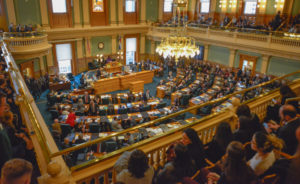A stark divide in electoral political philosophy was on display Tuesday at a House committee hearing on a bill that would make fundamental changes in the way Colorado’s presidential electoral votes are counted. The bill was passed on a party line vote by the Democrat majority.
Senate Bill 19-042, titled “National Popular Vote,” proposes Colorado join a compact between states that requires member states to appoint electors “in association with the national popular vote (NPV) winner” and to give all of their electoral votes to the NPV winner. Currently nine states have signed on to this compact.

The NPV totals for each candidate are determined by adding together the number of votes in each state “in which votes have been cast in a statewide popular election.” Colorado’s chief election official, the Secretary of State, is then required to declare which slate of presidential candidates is the NPV winner.
The bill mandates that the slate of electors nominated “in association with” the national popular vote winner, meaning by the party involved, be appointed as electors.
More than 80 people signed up to speak at the hearing.
Speakers largely fell into two camps: one supporting presidential election by popular vote and the other supporting the existing republican system of electoral representation.
Arguments for the bill focused on majority rule and one-man-one-vote ideas that object to the current system because it gives some votes more effective power than others thanks to the way electoral votes are assigned to the states.
Each state gets a minimum of two electoral votes just as each gets two Senators. Additional electoral votes are apportioned based on the number of federal Representatives a state has.
The state with the largest number of electoral votes is California, with 55. The smallest number is three in Alaska, Delaware, Montana, North Dakota, South Dakota, Vermont, and Wyoming. Colorado has 9 votes.
Arguments against the bill focused on how a national popular vote would be forever dominated by a very small number of heavily-populated states to the detriment of smaller states. This argument is based on the framework originally created in the U.S. Constitution by the Founders and the 12th Amendment.
One speaker pointed out that California’s Orange County alone has twice the population of Colorado.
The representative power of an electoral vote varies from roughly 140,000 to 520,000 citizens per electoral vote. According to an article in Slate magazine, this means that “one Wyoming voter has roughly the same vote power as four New York voters.”
This disparity is part of the compromise hammered out by the Founders to prevent domination in presidential elections by the most populous states and to help ensure that a president has at least some popular appeal in all states, which they believed would help prevent chicanery, and disenfranchisement of the citizens of smaller states.
The lengthy committee debate was robust, with both regular citizens and “expert level testimony” from legal experts from both sides.
Opponents of the NPV argued that the bill is not constitutional for a number of reasons, including the claim Colorado voters would be disenfranchised by having their votes discarded by the compact based on who the NPV winner is.
They said that the bill makes all of the states in the compact into one giant “winner-take-all” electoral super-state no matter how Coloradans might vote.
Other opponents argued that the U.S. Constitution requires any compact between the states be ratified by Congress.
Rep. Stephen Humphrey, R-Severance, made a motion to subpoena Attorney General Phil Weiser to testify before the committee about the numerous constitutional questions brought out during public testimony before moving it out of the committee.
Humphrey said, “As the chief lawyer for the state and the one responsible to represent our interests we believe it would be worthwhile to know in advance our attorney general’s opinion of the bill’s conformity to the Colorado and United States constitutions.”
Rep. Dave Williams, R-Colorado Springs said, “I think this motion is absolutely in order. There are serious constitutional questions that have arisen during the testimony.”
Rep. Jovan Melton, D-Aurora said, “Given that the role is in the legislature’s purview I don’t think that the AG counsel is really needed on this issue.”
The motion failed on a 6 to 3 party-line vote.
Turning the popular vote/representative government debate on its head, Williams proposed an amendment to submit the legislation to a public vote.
“We had a lot of testimony about the benefits of direct democracy and a direct vote so I think this would fall in line with those sentiments,” said Williams. “Let’s ask people if they want to allow their electoral votes to be based off of the other votes of bigger populations such as California and New York.”
Rep. Emily Sirota D-Denver responded saying, “We heard a lot of testimony about how we are a republic and so I think that it is our duty as the legislature to debate and decide on these important issues.”
The amendment was defeated along party lines, 6 to 3 and the bill was passed to the House Committee of the Whole.
Having already been heard and passed in the Senate, if the bill passes out of the House its next destination will be the Governor’s desk for his signature or veto.
The bill is sponsored by Sen. Mike Foote, D-Boulder, Rep. Emily Sirota, D-Denver and Rep. Jeni Arndt D-Fort Collins.


